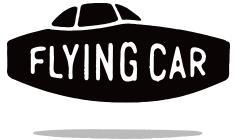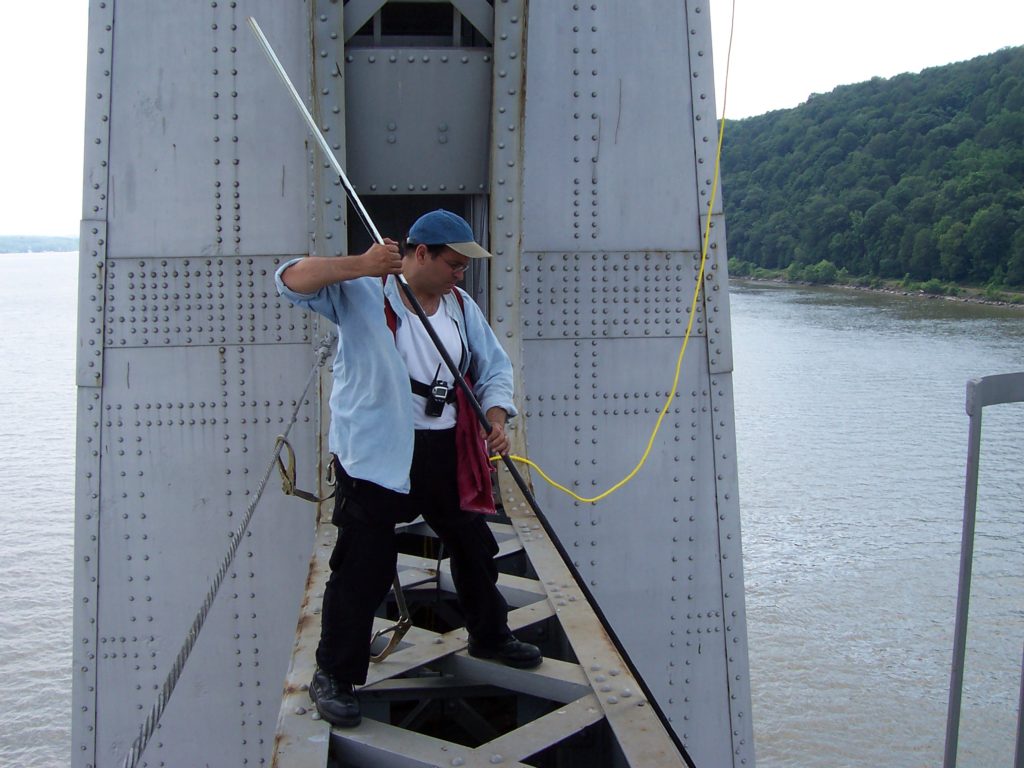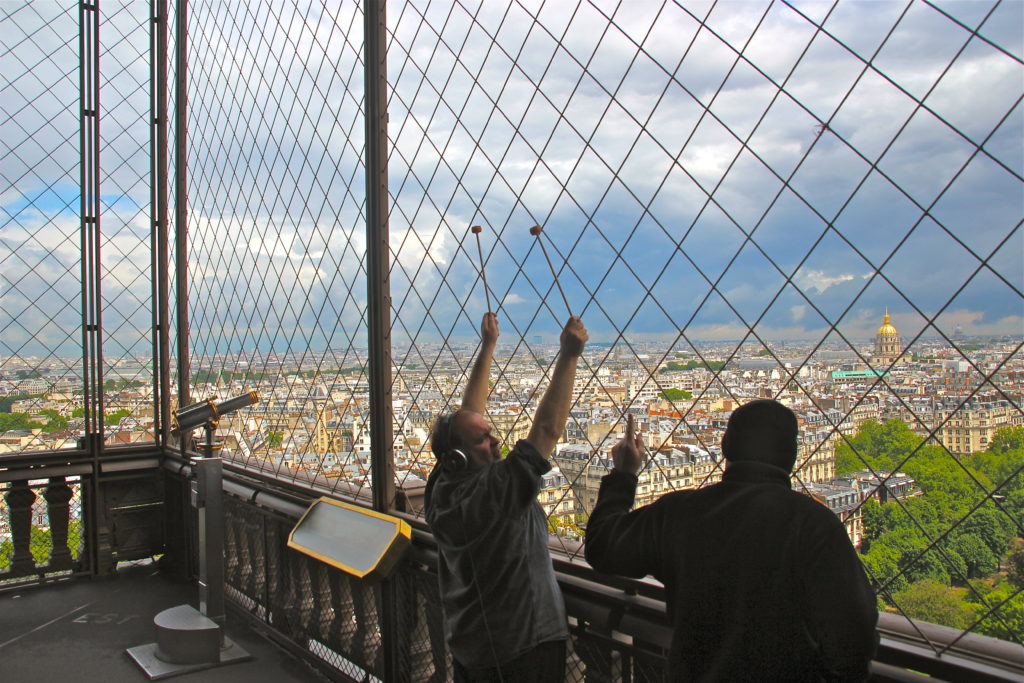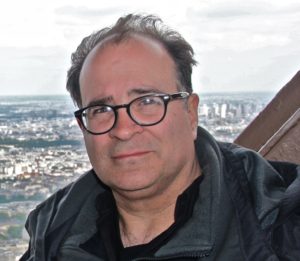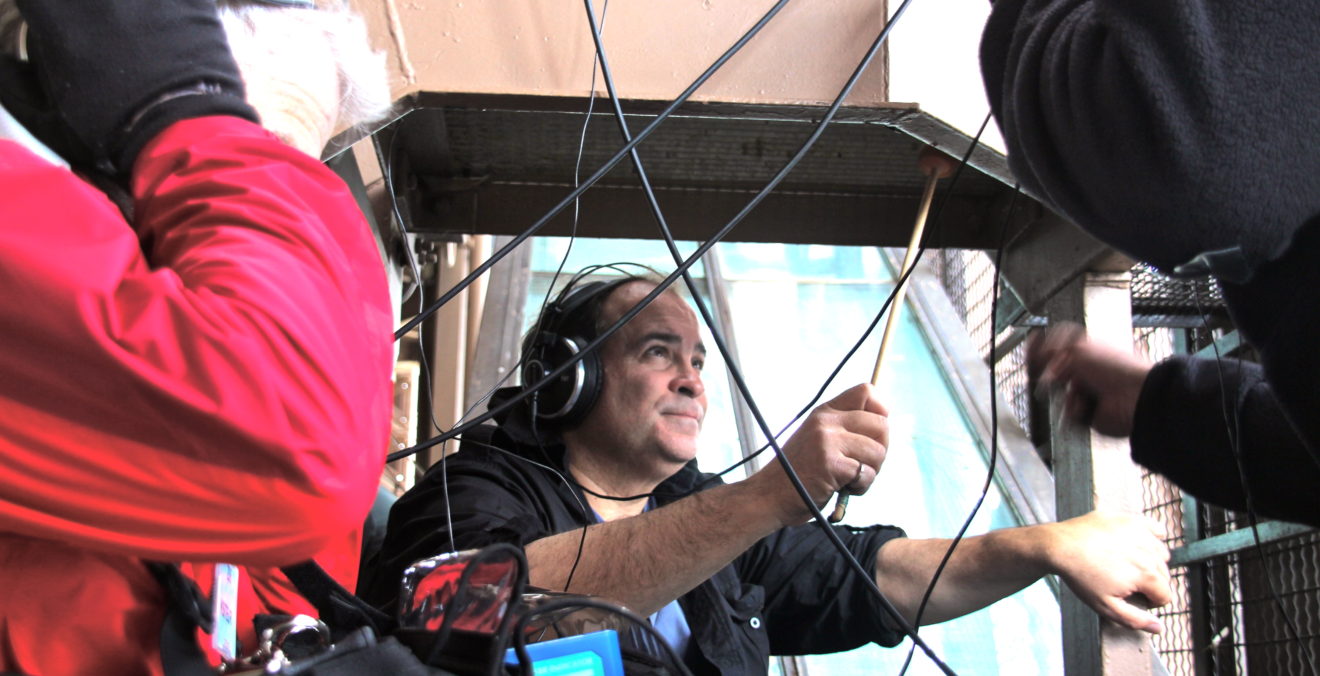
Joseph Bertolozzi is a flying car
Flight: A series of conversations Flying Car is having with individuals that are contributing, surprising, and delighting the world with something new.
W
hile recognized as both an architectural and engineering marvel, Paris’ Eiffel Tower has never been associated with music. That did not stop Joseph Bertolozzi from literally transforming this iconic structure into an instrument, using it to compose and produce a critically-acclaimed symphonic recording titled “Tower Music,” all played off sounds from the Eiffel Tower. More than a gimmick, his modern symphony is the creation of a wildly imaginative and simultaneously highly pragmatic artist.
Ironworks / Ferronnerie—An excerpt from Tower Music featuring a series of rhythmic cadences separated by a melodic refrain.
The only sounds on this recording are raw, unprocessed samples from the Eiffel Tower.
The son of working-class, Italian-American parents, Bertolozzi developed a global reputation while staying closely connected to his roots. Today he still works in Poughkeepsie, NY, the city in which he grew up and went to college. Balancing bold artistic instincts with an appreciation for tradition, he’s stayed close to family, especially a wife who seems to have consistently supported him taking chances as a musician.
In fact, Bertolozzi’s entire thought about transforming the Eiffel Tower into a percussive instrument was sparked by his wife. Musically, it dates back to when she and their daughter gave Bertolozzi a set of gongs for Christmas. At the time, age 45-years old, Bertolozzi’s primary focus was the organ. Church organ. But that single gift led to a fascination with percussion. Soon, Bertolozzi was accumulating more and more gongs. And then he created a composition called “The Bronze Collection,” an assemblage of gongs so varied, he designed and built a rack that allowed him to play 60 of them at a time.
A few years later, Bertolozzi’s wife started joking about what sounds might come if her husband could bang on the Eiffel Tower. When his wife first mentioned the thought, he initially laughed. But moments later Bertolozzi found himself thinking of the potential of a concert piece from music created totally from the structure, itself. It took 12 years and a lot of work to make it happen, but it’s proof of Bertolozzi’s combination of creativity and gumption.
First, he would proto-type the idea, transforming another (though less well-known) monument, the Mid-Hudson Bridge, into a piece of concert music titled simply “Bridge Music.” If that sounds simple, it wasn’t. Working solo, Bertolozzi had to convince teams of bureaucrats in New York to let him take over the entire bridge to practice and then perform it. But the experience was a great education for later managing officials in Paris to let him take over the highly regulated Eiffel Tower, never mind inspire and organize robust support teams overseas to help him perform his composition All this from a man who spent three decades earning a living after college as an organist at local Poughkeepsie churches and synagogues.
In between creating monumental music in Paris as well as Poughkeepsie, Bertolozzi has fulfilled dreams to play the world’s most iconic organs, been commissioned by West Point to compose a score in tribute to the Academy’s history, built a deeply loyal following as a composer, and thrived in a professional arena where success is only as close as one’s last creation. Somehow totally unpretentious but not afraid to boast, Joseph Bertolozzi is a Flying Car of an artist, perpetually restless in exploring what’s possible by imagining it, then doing the hard work to bring it to launch.
What follows is a Q&A with our musical friend.
So your wife has been fairly important – even if only inadvertently – in your artistic creations, no? What next might she inspire?
She’s very cautious these days.
How do you make money as a composer?
It’s extremely difficult. Most composers of art music are professors in college. Their day job is teaching while they compose on the side. I was a professional musician the whole time. I’ve never taught except private students and that’s extremely rare. And that was for organ. No, I’m a professional musician. I play and I compose. I’m 57 years old and I put my nose to the grindstone and stayed with it and it’s taken this long to get visibility. I’ve been lucky in my career in having almost everything I composed played, including my orchestral works. And in that respect you make money by performance royalties or if your music gets licensed for a film or live performances. But it’s pretty tough.
Have you tried to sell music for games or movies or television scores?
Not gaming. That genre came later on in my history and I still don’t understand it. But I got a call once from Sony Pictures. Mel Gibson had a movie coming out called “We Were Soldiers.” I had been commissioned the year before by the West Point Military Academy to write a piece for their 200th anniversary. I wrote this piece, The Contemplation of Bravery, and it was pretty well received in the band world. And the Sony Music Supervisor called to say that they wanted to license it for the film. They said “could you send a recording?” The thing is, I didn’t have a recording. When they license music for film, they just want to write one check and not worry about people who might have a claim on it. It has got to be professionally recorded because it’s going to a professionally made film. I didn’t have that. I had a couple of live recordings that I couldn’t monetize because it was recorded by the West Point Band. When Sony called me, I thought we would go to the studio and record it. They said “no, we want to license it. Send us the recording.” I asked “when do you need it?” They said “like yesterday.”
So it never happened. At that point I said to myself that I wouldn’t let that happen again. So I appealed to my fans and I raised about $40k to make a recording of my orchestral music. Which you can hear on my website. I recorded that work piece just in case there was ever another war movie made (laughs). And I recorded two other orchestral pieces. And that album got a little bit of traction in the classical world when it came out. You ask about turning points in my career. That was definitely one. But it was definitely on the same trajectory of being a classical composer. It wasn’t a 180-degree spin and becoming a percussionist and going out to playing architecture on the bridge.
You say you raised $40K. This was back before we had the internet like it is now (late 1990s before the internet was big), how do you raise the money?
I recommend this to anybody who asked “how do you get things done?” Nobody can do anything unless they have somebody who wants them to succeed in the background. That’s just a given. I have no problem going to meet people and shaking someone’s hand. Because I’m a musician people come up to me. They say “I loved your music, that was nice.” It’s a weird career path to take but being an organist you’re one guy in the church with 500 people for a service. And when you’re playing for Catholic services, Sunday Mass you’re playing for a couple of thousand people every weekend. So people would come up to me and when anyone said “If there’s anything I can do for you let me know,” I took down their name and number. I took them seriously. And I had little concerts leading up to raising this $40K. For those concerts, I’d go to these people on the list and ask, “can you give me a hundred dollars.” Then they’d say “Well, I didn’t mean I’d give you one hundred dollars.” So I’d ask “okay, what did you mean? Can you write me a letter of recommendation?”
Sometimes I had to take a loan from somebody but it wasn’t a loan from the bank. The thing is I slowly built up a fan base. And I live and work in the Hudson Valley. And I play in Poughkeepsie. I play in in the nearby areas. And I branched down to Westchester. So I stayed in touch with all these people. If I ever played a concert, I’d buy 300 postcards and stamps and I had a local print shop who was my patron in printing them at cost or sometimes for no cost. And I built up my fan base that way.
In the year 2000, I was 40, or was it 41 years old? Whatever, I had built my brand by remaining local and playing locally and enhancing that local performance along with my international touring. So when I had to raise 40K, I had a fan base. And I went back to those people when I wanted to do the Bridge music. That was another 40K over five years and Tower Music was another 60K. It was just fans who believed in me. Most of the money came from one particularly well-heeled patron. But some translated letters in French for me. And some gave me $10 dollars and others $25 dollars. And some gave me $2500. And some gave me money that became doubled by a matching-grant program at IBM where they worked.
For me it was income. I wasn’t a charity. I had to declare taxes on that. But it was a way to raise the money. And again there were a few well-heeled people who got me over the hump. They saw I could deliver. And the bridge thing was so far outside of anyone’s tent that it was a testament to them that they believed in me to do that. And then I went back to them for support on the Eiffel Tower composition. So a short answer to your question is I built up a fan base and kept in touch with them and included them and showed them that if you believe in me I’ll deliver and you can be part of it. Sort of it like an investor. But that’s not a short answer (laughs).
The more you talk, I think as much as an artist you’re a businessman.
You have to be.
What does it mean that “you have to be?”
My stepfather was a businessman. He appreciated that there were artists in the world. But he kind of considered them parasites the way I think most business people in America do. At some point I decided that I would not present myself begging as a parasite. I decided to present myself as someone who knows that certain people are interested in the arts. And if they like my art, we can do things together that are really cool. Because I have really cool ideas and all I’m lacking are the finances. I’m not asking for money. If someone gives me money they’re buying something from me.
Nobody can enjoy your music if they can’t hear it. And I know that the person is serious if they understand the business side. If you’re a professional, you have to find a way to deliver goods to somebody – somebody who may not even initially know that they need this or want this. That’s who you have to get on your side.
As I started doing this, I realized that there’s something in human nature that makes people want to give money to have a building named after them or someone they love. If it’s on a college campus, it’s to honor someone. If it’s in the commercial world, it’s advertising like the Honda Stadium. Regardless, there’s something about associating yourself with the arts that brings satisfaction to people. So I decided to act on that impulse.
How? Give us some examples.
I found out that the city of Poughkeepsie was celebrating its 200 years of its founding as a village and five years later for their 150th anniversary incorporation as a city. So I told the Hudson Valley Philharmonic I wanted to write a piece to celebrate Poughkeepsie and asked them to play my music. I told them it wouldn’t cost them anything. They just have to agree to program it so I could take that information and find someone who wants to put their name on it. Only here it was not on a building or an arena but on this piece of music. And I found a patron who would finance it in memory of their mother-in-law. She gave me $10K to write that piece.
When you tell people you play the pipe organ for a local church, they don’t want to talk to you anymore. But as a composer, I was raising my level of accomplishment and delivering every time I said I would. So people started coming to me. One woman wanted me to compose music for her husband’s birthday. She chooses the text. And she chooses the instruments. I couldn’t live off that, but this goes to being a businessman and an artist at the same time.
You don’t have the forum unless you’re entrenched in a community. I really believe in this maxim of “be local, be local, be local.” And then go out into the world, do other things and be local again. That will always be your best fan base. I don’t have management. I don’t have an agent. So far it’s not to be and I’m okay with that. I’m doing what I’m doing and I’m happy.
Like most artists, I’ve been a one-man show writing my own letters, answering my own phone, playing my own music, and that’s how you start. You invest in yourself and you create a tour and create a story and at a certain point you hope that you can find someone who can handle those aspects so it doesn’t take away from your music making.
Have you tried to get a manager?
I’ve been close a few times but it hasn’t happened. That’s fine. Though I think the Universal Studios of the world would benefit from having me on their roster. Obviously I don’t need them (Sony) to accomplish what I want to do but God, it’s so hard. There’s just one “Joe” on the phone.” I mean I spent 12 years getting Bridge Music and Tower Music made but it only took me 9 months to write both those pieces. Eighteen months out of 12 years. The rest of those 12 years was making phone calls – and raising money – and all the while I’m going to choir practice and playing for a funeral in the morning and trying to shoe horn this all in. And having a massively supportive wife and daughter.
During the time you’re composing you’re still playing the organ. You stayed local as an organist but stopped organizing tours as an organist. Your bread and butter is the church music.
Yes. It might seem like a secondary or even tertiary circle of music making but there are astounding musicians and singers playing in churches. I think most people just see the local church as they have someone who kind of just does it for the church and is not professional. That’s not true.
What you’re saying reminds me of the value of churches that remains hidden from those who don’t attend them. If you don’t attend them, you usually only notice if there’s a wedding or a funeral with a crowd. What you’re pointing out the extended importance of these institutions like churches – and other local institutions – the importance to the vibrancy of a community outside that touches them. Like the astounding number of musicians playing in churches.
Sure. There are people who go to churches. There are businessmen who go there. There are all sorts of people who go. Being a musician, myself, being an organist, I got to meet those people. This is all to say I built my own infrastructure from my personal relationships.
Any Marketing 101 course would say business is relationships. You could have the best thing on the table but if the person across the table doesn’t like you, you don’t get the job. It’s building these relationships and showing people that you’re not going to waste their time.
What, if anything, would you like your audience to take away from your compositions about the Eiffel Tower or the Bridge?
I had no agenda. I did it purely for the musical thrill of saying “I can do that.” So what do I want them to take away? I want them to enjoy the music mostly and if they get a sense of a greater appreciation that there is music everywhere that would be nice. But I don’t have an agenda like showing man’s superiority over inanimate objects. It was purely music, that’s all.
Everyone could look at the Eiffel Tower but you let them hear the Eiffel Tower.
Any artist has to transcend the material. The material is there. All the notes are already there. The piano exists. The violin exists. It’s nothing unless someone plays it or creates music. Before Warhol did all the Soup Cans, there wasn’t anything with those cans until he did it. There will be something in your future that transcends your materials. That’s where you create art. That’s where you create something different. I wouldn’t work on something for 12 years if I didn’t think it was massively cool idea. I’m a dreamer but I’m pragmatic.
Another question around that – is there anything that music – especially classical music – can offer the public that writing or painting can’t. About the Eiffel Tower or the Bridge?
I think that goes back to transcending material. The bridge is a tool to get people from one side to another. The Eiffel Tower was a monument. For a century that’s what it was. And I transcended what it was by bringing out its vibrations and creating music with it.
It’s interesting. If someone told me I was going to be a percussionist at 45 years old, I would have said “huh?” I could not have planned this. This wasn’t by design. I didn’t start out with that as my goal. If you’re a baseball player, you want to go to the World Series. If you’re a bi-athlete, you want to go to the Winter Olympics. I’m a composer. I just wanted to write music. But I could never have planned for all these things.
I guess it goes to rolling with the punches. I could have said “I’m not a percussionist. I’m not going to do the gong thing or do Bridge Music. But I said “this is something that is cool that I can do that other people would allow me to do and bring a whole new perspective to the world.”
The Eiffel Tower, they get hundreds of proposals from artists to do things and it’s all visual. The one thing that was less visual was one group wanted to plant vines like it was a giant trellis from the ground to the top. It was a cool idea but practically speaking how could they have watered it? Or what happens if one side starts to fade or die? I brought something that was really from left field.
How did you even decide to become a composer?
When I was little I was interested in all the arts. I liked painting, sculpture, and music. I got sick one day and stayed home with an ear ache. My parents were off to work. This was back in the day when one could be home alone in bed for two or three days. And my godfather would stop in on me because he worked in the same apartment building where we lived. He had a liquor store in the bottom of the building. He’d come in and check in on me.
He bought me a Disney record to pass the time. Side One of the record was the life story of Bach and Haydn. It was a narration with their music interspersed. On Side Two was the life stories of Mozart and Beethoven. My mother would put it on when she left in the morning, and I listened to Side One 30 times. Then my godfather would come in during the course of the day and turn it over. I was listening to these stories again and again. They were told very well – as you can imagine with a Disney record – with the authentic music. It brought out the artist in me. I no longer wanted to be a painter or actor. I wanted to do my art in music. And that’s when I told my parents that I wanted to be a composer.
I was nine years old. My parents interpreted what I said as “Joey wants to take piano lessons.” In my wisdom as a nine-year old, I said “no, I just want to be a composer.” They said if you want to write songs, you have to learn an instrument. So they started me on lessons. And I told my teacher at the beginning that I wanted to be a composer. He was very good about teaching me to write out the music. And that’s how I started. It started from an earache.
Talk about transcending the material – the material is piano lessons and your earache.
The earache did get better. So yes.
The other thing that comes up is the importance of storytelling. What is the importance of storytelling to you – is it more important as a composer or as an artist trying to build your brand?
When I talk to young musicians and I say to this to them; what makes exciting music – from a kid playing Mary Has a Little Lamb or from someone who writes music that’s very esoteric – when you’re playing a piece or writing a piece you want to get people’s attention. You want to take people on a journey. In that journey, you want to get them interested in the protagonist of your story. I present it to them and think of this in writing my own piece – does this grab attention? – and then you need to wrap that up again at the end. Whether it’s wrapping up at the end with something sad or triumphant. Particularly with music. Because with music you want them to hear the whole piece. Why should they spend time with you – and with music you want them to hear the whole piece even if it’s just three minutes. Why should they spend their time with you?
What led you to that belief?
It’s probably a synthesis of different things that I’ve seen. But it’s not as mercenary as “I have to grab your attention.” It’s not my job. I am simply expressing myself. People who like my music will like some of it. They won’t like all of my music. I’ve written music for stage or civic music for Poughkeepsie, West Point, etc. Each has a different vibe to it.
Aaron Copeland was writing music for the masses. Walt Whitman was writing poetry not in the exalted voice of the great romantic poets that was popular at the time but a whole other vocabulary. Dante wrote the Commedia in the vulgar everyday Italian. So those are people who took common material, transcended that material and created art. It doesn’t have to be so esoteric that you need a degree to understand it. Getting them to be a part of what you thought interesting enough to write whether you’re a poet or a musician, that’s the intention.
Beyond finding funding, are there business issues composers face that you think would surprise people in the business world?
For composers of art music, people might not realize how much goes into it. Even if I write a piece for four musicians, after I write the full score the individual parts have to be broken out. The violist doesn’t need the cellist’s music. And the cellist doesn’t need the trombonist’s music. That’s costly. Then there’s the rehearsal. I think people don’t realize when musicians rehearse they have to get paid for that time. You have to finance the rehearsal. There’s promotion. It’s expensive. So there’s a whole range of things beyond just writing the music. If I wrote a solo piano piece, I could play that myself, which takes a lot of this out of the equation. But if your natural gesture is orchestral music, for music played by more people than you, then really what you’re doing is finding a group to champion your music. And that group has its own board of directors and its own fund raisers.
What does branding mean to you?
It means that people look at you or your product in the way you want them to look at it. What I want people in my own personal case to know is that this little Italian American guy from Poughkeepsie is a composer. It’s funny. When the NY Times first started covering Bridge Music and Tower Music – and this was six or seven years ago – they were saying “local composer” “obscure composer.” Well, that morphed over time into simply “composer.” That branding kind of changed because of the persistence of my purpose.
How would you define your brand?
The highest quality craftsmanship. Authentically original musical ideas. I think those two cover it.
I always remember – it’s not enough to have an idea. It’s about bringing an idea to fruition.
To visit Joseph Bertolozzi’s website, click here
For a link to Joseph Bertolozzi’s Tower Music, click here
